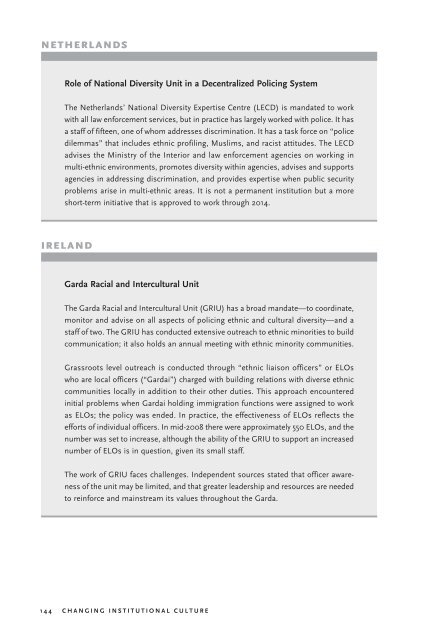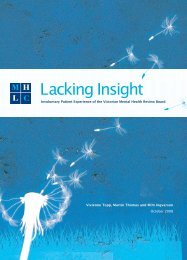Reducing Ethnic Profiling in the European Union - Open Society ...
Reducing Ethnic Profiling in the European Union - Open Society ...
Reducing Ethnic Profiling in the European Union - Open Society ...
- No tags were found...
You also want an ePaper? Increase the reach of your titles
YUMPU automatically turns print PDFs into web optimized ePapers that Google loves.
NETHERLANDSRole of National Diversity Unit <strong>in</strong> a Decentralized Polic<strong>in</strong>g SystemThe Ne<strong>the</strong>rlands’ National Diversity Expertise Centre (LECD) is mandated to workwith all law enforcement services, but <strong>in</strong> practice has largely worked with police. It hasa staff of fifteen, one of whom addresses discrim<strong>in</strong>ation. It has a task force on “policedilemmas” that <strong>in</strong>cludes ethnic profil<strong>in</strong>g, Muslims, and racist attitudes. The LECDadvises <strong>the</strong> M<strong>in</strong>istry of <strong>the</strong> Interior and law enforcement agencies on work<strong>in</strong>g <strong>in</strong>multi-ethnic environments, promotes diversity with<strong>in</strong> agencies, advises and supportsagencies <strong>in</strong> address<strong>in</strong>g discrim<strong>in</strong>ation, and provides expertise when public securityproblems arise <strong>in</strong> multi-ethnic areas. It is not a permanent <strong>in</strong>stitution but a moreshort-term <strong>in</strong>itiative that is approved to work through 2014.IRELANDGarda Racial and Intercultural UnitThe Garda Racial and Intercultural Unit (GRIU) has a broad mandate—to coord<strong>in</strong>ate,monitor and advise on all aspects of polic<strong>in</strong>g ethnic and cultural diversity—and astaff of two. The GRIU has conducted extensive outreach to ethnic m<strong>in</strong>orities to buildcommunication; it also holds an annual meet<strong>in</strong>g with ethnic m<strong>in</strong>ority communities.Grassroots level outreach is conducted through “ethnic liaison officers” or ELOswho are local officers (“Gardai”) charged with build<strong>in</strong>g relations with diverse ethniccommunities locally <strong>in</strong> addition to <strong>the</strong>ir o<strong>the</strong>r duties. This approach encountered<strong>in</strong>itial problems when Gardai hold<strong>in</strong>g immigration functions were assigned to workas ELOs; <strong>the</strong> policy was ended. In practice, <strong>the</strong> effectiveness of ELOs reflects <strong>the</strong>efforts of <strong>in</strong>dividual officers. In mid-2008 <strong>the</strong>re were approximately 550 ELOs, and <strong>the</strong>number was set to <strong>in</strong>crease, although <strong>the</strong> ability of <strong>the</strong> GRIU to support an <strong>in</strong>creasednumber of ELOs is <strong>in</strong> question, given its small staff.The work of GRIU faces challenges. Independent sources stated that officer awarenessof <strong>the</strong> unit may be limited, and that greater leadership and resources are neededto re<strong>in</strong>force and ma<strong>in</strong>stream its values throughout <strong>the</strong> Garda.144 CHANGING INSTITUTIONAL CULTURE
















